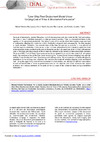Identificador persistente para citar o vincular este elemento:
https://accedacris.ulpgc.es/jspui/handle/10553/106983
| Título: | Liner Ship Fleet Deployment Model Under Varying Cost of Time: A Bi-criterion Formulation | Autores/as: | Herrera Rodrigueza, Manuel Agrell, Per J. Manrique De Lara Peñate, Casiano Trujillo Castellano, Lourdes |
Clasificación UNESCO: | 531212 Transportes y comunicaciones | Palabras clave: | Fleet deployment Liner shipping MIP Railway traffic Value of time |
Fecha de publicación: | 2020 | Conferencia: | International Working Seminar on Production Economics 2020 | Resumen: | Because of decreasing product lifecycles, cost of obsolescence and stock-outs for the final consumers, the value of time in maritime transport is under permanent scrutiny. Time is a determinant factor in the logistics of the globalized production. Any delay in one of the supply chain intermediate steps can lead to bottlenecks affecting the production and/or distribution of goods and consequently, the time needed to reach markets. Therefore, the consideration of the time perspective is essential to any attempt of maritime logistics modelling. In this paper, a liner ship fleet deployment (LSFD) model is applied to a set of transoceanic routes connecting the port of Shanghai, as the only departure point in China, with several ports of the East and West coasts of North America, simulating the weekly containerized traffic between China and USA. The US West Coast ports act as transshipment hubs via the intermodal US rail system and/or the maritime routes to the East coast traversing the Panama Canal. Several shipping lines operate both the Trans-Pacific and Trans-Canal routes with different ships. The rail system is included with specific adaptations to the railways cost structure. We calculate the trade-off between shipping costs and transit time. Using the opportunity cost of time estimated in other studies, we identify the optimal combination of cost and transit time in terms of generalized costs for the importer. Our model assesses the impact of delays from various problems in the ports of the US coast in the China-US trade using a bicriterion formulation. | URI: | https://accedacris.ulpgc.es/handle/10553/106983 | Fuente: | 21st International Working Seminar on Production Economics |
| Colección: | Actas de congresos |
Los elementos en ULPGC accedaCRIS están protegidos por derechos de autor con todos los derechos reservados, a menos que se indique lo contrario.
